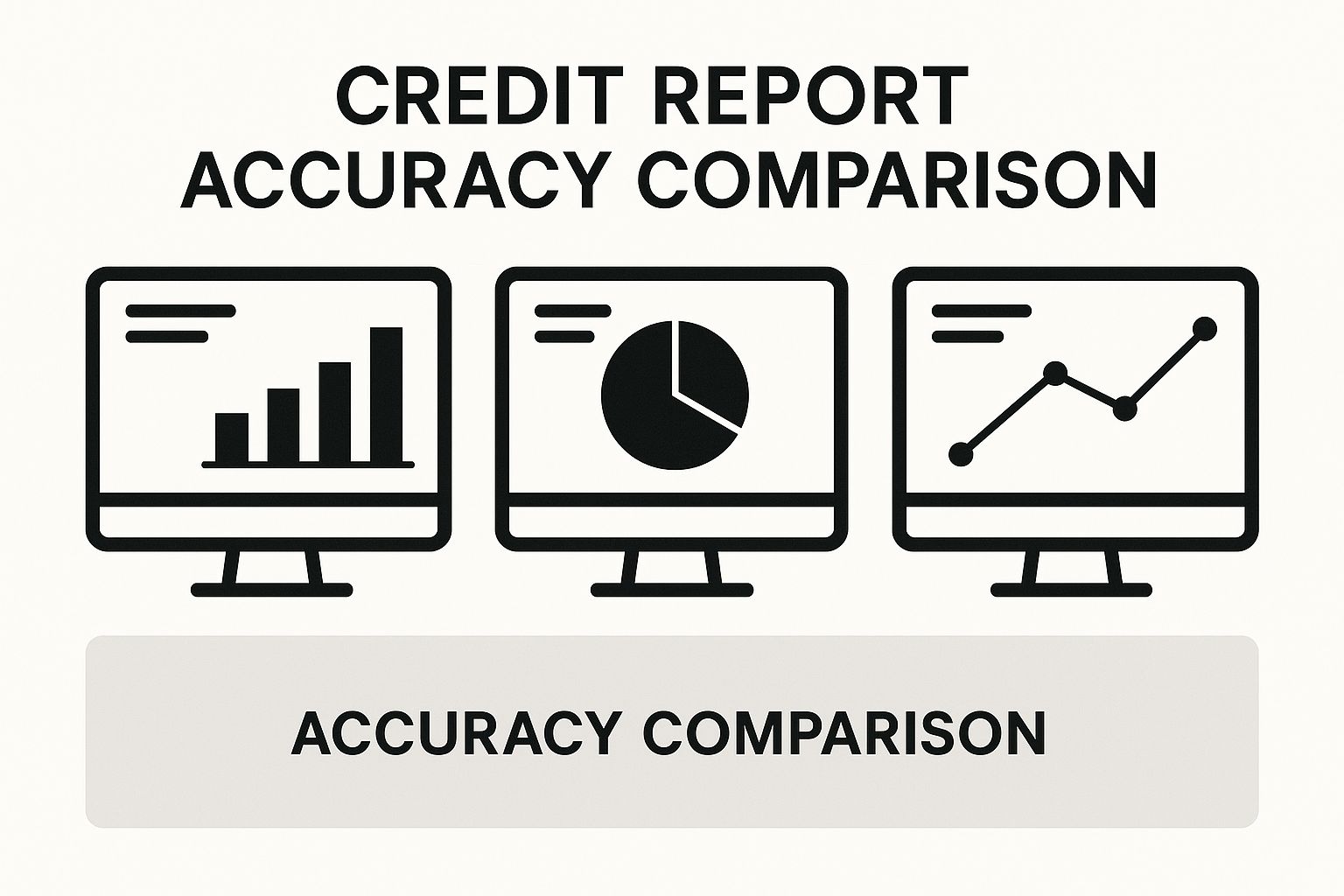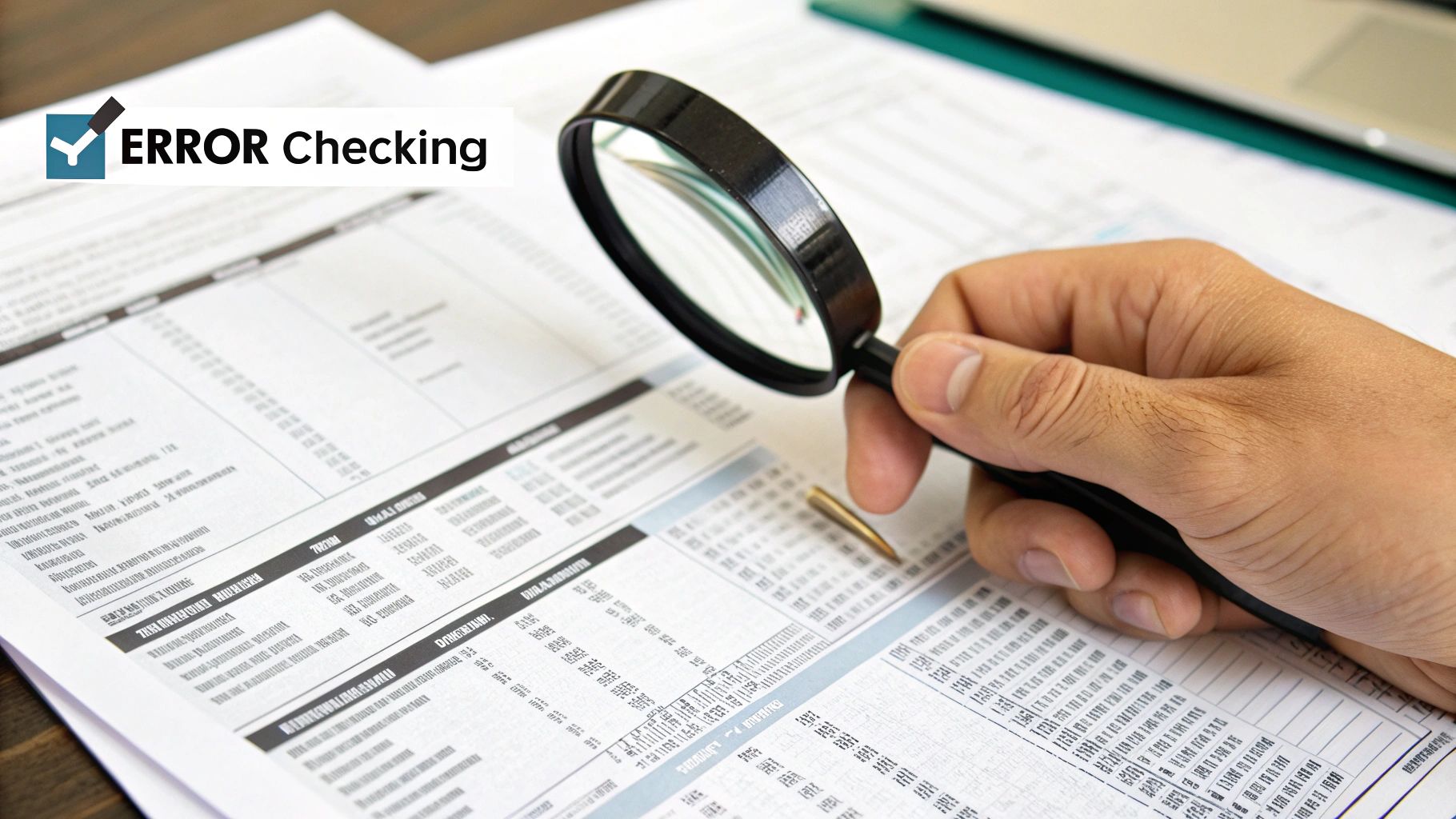Which Credit Bureau Is Most Accurate? An In-Depth Guide

If you're trying to figure out which credit bureau is the most accurate, let me save you some time: there isn't one. The simple answer is that no single credit bureau is officially the "most accurate."
Instead, Equifax, Experian, and TransUnion operate as separate, competing companies. It's completely normal for their reports to have discrepancies. The goal isn't to find one superior bureau, but to understand why their data differs and what that means for your financial life.
Why No Single Credit Bureau Is the Most Accurate

The idea that you can rank the "Big Three" by accuracy just isn't how the system works. They are distinct businesses that don't share information with each other in real-time. Think of them as three separate detectives investigating your financial history.
Each bureau gathers information independently from thousands of sources called data furnishers. These are the banks, credit card issuers, and lenders you do business with every day.
The Role of Data Furnishers
Here’s the real reason for the differences: Lenders report your payment history on their own schedules. A bank might report to one bureau faster than another, or they may only report to one or two of the three. This reporting is voluntary and varies widely.
For instance, a new auto loan could pop up on your Experian report this week but not hit your TransUnion report for another 30 days. This isn't an error. It’s just a timing difference based on how and when that lender reports.
Comparing Data Collection Models
The bureaus also have slightly different ways of collecting data and historically specialized in different areas. While their operations have become more similar over time, some subtle distinctions can still influence the information they have on you.
Ultimately, thinking of one bureau as inherently more accurate than the others is the wrong way to look at it. Your financial profile is a mosaic built from information supplied by your lenders. The only way to see the complete picture is to review your reports from all three sources—a critical habit for anyone serious about monitoring their credit.
Understanding Why Credit Report Errors Happen
To figure out which credit bureau is the most accurate, you first have to understand what they actually do. The "Big Three" don't create the data themselves; they're giant data collectors. They pull in financial information from thousands of sources like banks, credit card companies, courts, and other agencies.
This means the accuracy of your credit report completely hinges on the quality of the information those sources send over. If your bank messes up and reports a late payment by mistake, that error is going to show up. The bureaus are really just a mirror reflecting the data they're given.
Common Triggers for Inaccuracies
Errors can sneak into this massive data stream in a few common ways. Given the sheer volume of information being processed every single day, even a tiny mistake can snowball into a big problem. A simple typo during manual data entry at your lender’s office could easily result in an incorrect account balance or payment status on your report.
Another frequent problem is the lag in reporting times. A creditor might update your balance with Experian on the first of the month but not get around to sending that same update to TransUnion for a few weeks. This creates a temporary, but very confusing, difference between your reports. These timing issues aren't the bureaus' fault; they're just a byproduct of a disconnected reporting system. It’s inconsistencies like these that can cause a sudden dip in your credit score, which is why keeping an eye on your reports is so critical. You can learn more about why your credit score might be dropping in our detailed guide.
The Problem of Mixed Files
One of the most damaging errors you can find is a "mixed file." This happens when someone else's information gets accidentally merged into your credit report, usually because of a similar name or Social Security Number.
Imagine "John A. Smith" suddenly seeing accounts and payment history belonging to "John B. Smith" on his report. This isn't just a small hiccup; it can completely wreck a credit score and get you denied for a loan.
These situations show that "accuracy" isn't a static thing you can measure for each bureau. The real problem isn't about which credit bureau is most accurate but rather the complex and error-prone system that feeds information to all three of them. The only surefire way to protect yourself is to proactively check your reports from Equifax, Experian, and TransUnion to catch these issues before they do any real harm.
How Equifax, Experian, and TransUnion Compare
Ever wonder why your credit score seems to change depending on who's checking it? It’s a common source of confusion, but there’s a simple reason: the three major credit bureaus aren’t all working with the same information.
While no single bureau is definitively "the most accurate," their operational differences mean one might paint a more complete picture of your financial life to a specific lender. It all comes down to which lenders report to them, the scoring models they use, and where their historical market focus has been.
Many people assume all three bureaus have identical data and use the same scoring formulas, but that's a myth. Each one has its own proprietary scoring models and unique relationships with the companies that provide your credit information.
This means the auto loan you applied for might show up instantly on your Experian report, while a personal loan from your local credit union might only be reported to Equifax. These reporting discrepancies are the primary reason your credit profiles vary.
Data Sources and Lender Relationships
The heart of your credit report is the data fed to the bureaus by lenders. While massive national banks usually report your activity to all three, smaller regional banks, credit unions, and other creditors often don't. They might report to just one or two, creating instant differences in your credit files.
Historically, each bureau developed its own strengths. For example, Experian has always had a strong foothold in the credit card and retail lending industries, so your Experian report might have a richer history of your revolving credit accounts. TransUnion, on the other hand, is known for its robust data for tenant screening and personal loans.
This infographic gives a great high-level look at the factors that influence each bureau's reporting.

As you can see, even with similar inputs, the outputs—your actual credit reports and scores—can diverge based on their unique data processing and partnerships.
Scoring Models and Their Nuances
Adding another layer of complexity are the scoring models themselves. The FICO Score is the one everyone knows, but each bureau also developed its own models, like the Equifax Credit Score. On top of that, there isn't just one FICO score; there are dozens of different versions, each tailored for a specific type of lending, like auto loans or mortgages.
A lender pulling your credit for a home loan might use a completely different FICO version than a bank uses for a credit card application. These specialized scores weigh information differently, causing your score to fluctuate depending on who’s checking it and why.
The only way to get a true handle on your financial standing is to keep an eye on your information across all three bureaus. You can learn more about the benefits of this approach in our guide to monitoring all three bureaus.
Head-to-Head Comparison of the Three Major Credit Bureaus
To really understand why your reports and scores can differ so much, it helps to see the bureaus' operational models side-by-side. The table below breaks down their historical strengths and common use cases.
Ultimately, the right question isn't "Which credit bureau is most accurate?" but rather, "Which bureau holds the most relevant data for this specific financial decision?" Since you can never be sure which report a lender will pull, monitoring all three is the only way to get a complete and actionable view of your credit health.
The Legal Standards for Credit Reporting Accuracy
When we start asking which credit bureau is the most accurate, it's easy to miss a key piece of the puzzle: they're all playing by the same rules. Federal law holds all three bureaus to the same legal standard, setting a baseline for how they're supposed to handle your sensitive financial data.
The foundation for all of this is the Fair Credit Reporting Act (FCRA), a really important piece of consumer protection law. The FCRA doesn't actually demand perfection from the bureaus. Instead, the law says they have to follow “reasonable procedures to assure maximum possible accuracy.” It’s a bit of a flexible phrase, but it puts a clear legal duty on the bureaus to have solid quality control in place.
But here's the thing—the bureaus aren't making this information up. The data comes from somewhere else, and that responsibility lands squarely on the "data furnishers." These are the banks, credit card companies, and collection agencies reporting on your financial life.
Who Is Legally Accountable for Errors?
Under the FCRA, accountability is a two-way street. Both the credit bureau and the company that provided the data have legal obligations to get it right.
This system of shared responsibility is designed to be a safety net, but it's far from perfect. If you have a stubborn error on your report, the breakdown could be happening at the bureau or with the original lender.
The U.S. Fair Credit Reporting Act (FCRA) legally requires bureaus to set up “reasonable procedures to assure maximum possible accuracy,” yet mistakes are incredibly common. Problems pop up all the time, from simple human data entry typos at the bank to more serious issues like misidentifying consumers or pulling faulty information from public records. You can discover more insights about common error sources and see just how big their impact can be.
Ultimately, the law gives us a way to fix things, not a guarantee that our reports will be flawless from the get-go. The fact that errors are so persistent is exactly why you have to stay on top of your credit. It's not just a good habit—it's a critical part of managing your financial health in a complex and imperfect system.
A Practical Guide to Managing Your Credit Reports

Since no single credit bureau can claim to be the most accurate, the responsibility for your data's integrity ultimately falls on you. You're the best person to advocate for your own financial story. Actively managing your credit reports isn't just a good idea—it's essential for your long-term financial health.
Your first move is to get your hands on all three reports. Thanks to federal law, you can pull free weekly copies from the one and only official source: AnnualCreditReport.com. This is the go-to site for accessing your Equifax, Experian, and TransUnion files without any strings attached.
How to Review Your Reports
Once you have your reports, it's time to put on your detective hat. Don't just give them a quick glance. You need to scrutinize every single line item, because even the smallest errors can have an outsized impact on your credit scores and your ability to get a loan.
Think of it as a detailed audit. I recommend creating a checklist to make sure you hit all the key areas where mistakes love to hide.
The Dispute Resolution Process
Found something wrong? The Fair Credit Reporting Act (FCRA) empowers you to dispute it directly with the credit bureau. Each one—Equifax, Experian, and TransUnion—has a process for this, usually through an online portal, mail, or phone. Filing online is almost always the quickest way to get the ball rolling.
When you file a dispute, you need to be crystal clear about what's wrong and why it's wrong. Backing up your claim with documentation, like a bank statement that proves you made a payment on time or a letter from the creditor, will dramatically improve your odds of success.
After you submit your dispute, the bureau generally has 30 days to investigate. They'll reach out to the company that supplied the information (the "data furnisher") to verify it. Based on their findings, the item will either be updated, deleted, or confirmed as accurate.
For ongoing accuracy, a service that provides credit monitoring for all three bureaus can be a real game-changer, giving you timely alerts and a lot more peace of mind.
Common Questions About Credit Bureau Accuracy
Even knowing there's no single "most accurate" credit bureau, you probably still have a few practical questions. The world of credit reporting is tricky, and it’s natural to wonder how all these small differences actually affect you.
Let's clear up some of the most common questions we get. This is your quick guide to putting this knowledge into practice and feeling more in control of your financial data.
Why Are My Credit Scores Different Across the Three Bureaus?
This is easily the most common point of confusion for people. It's jarring to see three different scores, but it happens for a few key reasons, even when the data looks almost identical.
First off, not all lenders report to all three bureaus. Your local credit union, for example, might only send your loan information to TransUnion and Equifax. That leaves Experian completely in the dark about that account, creating an instant data gap.
Timing is another big factor. Your credit card company could report your new balance to Experian on the 5th of the month but not update TransUnion until the 15th. For those ten days, your scores could be noticeably different because of that lag.
Which Credit Bureau Is Most Important for Mortgages or Auto Loans?
This is a huge question because, yes, certain industries definitely play favorites. While there are no hard-and-fast rules, there are some clear tendencies you should know about.
How Often Should I Check My Credit Reports?
As a best practice, you should look over all three of your credit reports at least once every few months. But really, how often you check should match your financial goals.
If you're in the middle of applying for a mortgage or another major loan, you need to be checking your reports weekly, if not daily. This lets you spot and dispute an error the moment it appears, before it has a chance to mess up your application.
For just maintaining good financial hygiene, a check-in every one to three months is plenty. You'll stay on top of any new accounts, inquiries, or signs of identity theft. Remember, federal law gives you free weekly access to all three reports at AnnualCreditReport.com, so there's no reason not to be vigilant. Being proactive is the only way to make sure the data shaping your financial life is correct.
Don't let errors or surprises on your credit reports hold you back. With All3Credit, you can monitor your scores and reports from Equifax, Experian, and TransUnion in one simple dashboard. Get real-time alerts and the complete visibility you need to take control of your financial future for just $12.99 a month. Start your comprehensive credit monitoring today.